|
A major contention that many people – both young and old – have with the Church is that it is an institution of “Thou Shalt Nots” and other moral imperatives that have little or no relevance in the modern world. In essence, the Church is seen as little more than an outdated social services agency, or even worse, a dismal and ahistorical museum perpetuating a false sense of reality. This emerging perception of the Church parallels a larger cultural shift from the acceptance of objective truth toward a secular relativism.
In a recent address to a group of U.S. bishops in Rome for their ad limina visit, Pope Benedict XVI proposed that the Church’s response to this “eroded” perception of reality is one of the greatest “spiritual and cultural challenges of the new evangelization.” Because of the Catholic Apostolate Center’s commitment to being an instrument of the new evangelization, this bears much significance on the direction of our work. But what impact does – or should – this emerging situation have on our daily lives? In the words of the Holy Father, “the Church in the United States is called, in season and out of season, to proclaim a Gospel which not only proposes unchanging moral truths but proposes them precisely as the key to human happiness and social prospering”. As Catholics, we are called to uphold the perceptive vision of reality that has been gifted to us by the Holy Spirit through Divine Revelation. It is only through upholding this vision that we can ever hope to accurately understand our place in the world around us and “the deepest truth about our being and ultimate vocation, our relationship to God.” As Catholics, we are beneficiaries of an astonishing intellectual legacy that was developed over the course of two millennia by scholars who examined these mysteries through the complimentary lenses of faith and reason. Contrary to popular opinion, the Church’s moral teaching is not merely a hodge-podge of archaic prohibitions, but a doctrine that is congruent with the logical nature of reality and informed by Divine Revelation. As the Pope explained in his address, the moral teaching of the Church “is not a threat to our freedom, but rather a ‘language’ which enables us to understand ourselves and the truth of our being, and so to shape a more just and humane world. She thus proposes her moral teaching as a message not of constraint but of liberation, and as the basis for building a secure future.” If we are to succeed in being apostles of the New Evangelization, then one of our most critical objectives should be to proclaim the beauty, consistency, and relevance of the Church’s moral teaching, without which we would be left with an incomplete view of our own humanity. Informed by this teaching, it is also important that we serve as prophets in the public sphere of these truths. As Pope Benedict XVI emphasized, “it is imperative that the entire Catholic community in the United States come to realize the grave threats to the Church’s public moral witness presented by a radical secularism which finds increasing expression in the political and cultural spheres.” Even more pertinent to the work of the Catholic Apostolate Center, the Holy Father went on to say that “the preparation of committed lay leaders and the presentation of a convincing articulation of the Christian vision of man and society remain a primary task of the Church in your country; as essential components of the new evangelization, these concerns must shape the vision and goals of catechetical programs at every level.” Blessed John XXIII was once quoted as saying the following: “We are not on earth to guard a museum, but to cultivate a flourishing garden of life.” The New Evangelization is not concerned with re-presenting a forgotten memory from the past, but with re-proposing the living and eternal truth of Jesus Christ that continues to sustain His Church. The Church’s moral teaching is just one part of this truth, but as the Holy Father makes clear, it is an essential part to humanity’s self-understanding. Brett Garland is a Collaborator with the Catholic Apostolate Center. Audio of the Holy Father’s address available here. CNS Report about the Holy Father's address. Editor's Note: This post was originally published in 2012.
0 Comments
A major contention that many people – both young and old – have with the Church is that it is an institution of “Thou Shalt Nots” and other moral imperatives that have little or no relevance in the modern world. In essence, the Church is seen as little more than an outdated social services agency, or even worse, a dismal and ahistorical museum perpetuating a false sense of reality. This emerging perception of the Church parallels a larger cultural shift from the acceptance of objective truth toward a secular relativism.
In an address given in 2012 to a group of U.S. bishops in Rome for their ad limina visit, Pope Benedict XVI proposed that the Church’s response to this “eroded” perception of reality is one of the greatest “spiritual and cultural challenges of the new evangelization.” Because of the Catholic Apostolate Center’s commitment to being an instrument of the new evangelization, this bears much significance on the direction of our work. But what impact does – or should – this emerging situation have on our daily lives? In the words of the Holy Father, “the Church in the United States is called, in season and out of season, to proclaim a Gospel which not only proposes unchanging moral truths but proposes them precisely as the key to human happiness and social prospering”. As Catholics, we are called to uphold the perceptive vision of reality that has been gifted to us by the Holy Spirit through Divine Revelation. It is only through upholding this vision that we can ever hope to accurately understand our place in the world around us and “the deepest truth about our being and ultimate vocation, our relationship to God.” As Catholics, we are beneficiaries of an astonishing intellectual legacy that was developed over the course of two millennia by scholars who examined these mysteries through the complimentary lenses of faith and reason. Contrary to popular opinion, the Church’s moral teaching is not merely a hodge-podge of archaic prohibitions, but a doctrine that is congruent with the logical nature of reality and informed by Divine Revelation. As the Pope explained in his address, the moral teaching of the Church “is not a threat to our freedom, but rather a ‘language’ which enables us to understand ourselves and the truth of our being, and so to shape a more just and humane world. She thus proposes her moral teaching as a message not of constraint but of liberation, and as the basis for building a secure future.” If we are to succeed in being apostles of the New Evangelization, then one of our most critical objectives should be to proclaim the beauty, consistency, and relevance of the Church’s moral teaching, without which we would be left with an incomplete view of our own humanity. Informed by this teaching, it is also important that we serve as prophets in the public sphere of these truths. As Pope Benedict XVI emphasized, “it is imperative that the entire Catholic community in the United States come to realize the grave threats to the Church’s public moral witness presented by a radical secularism which finds increasing expression in the political and cultural spheres.” Even more pertinent to the work of the Catholic Apostolate Center, the Holy Father went on to say that “the preparation of committed lay leaders and the presentation of a convincing articulation of the Christian vision of man and society remain a primary task of the Church in your country; as essential components of the new evangelization, these concerns must shape the vision and goals of catechetical programs at every level.” Blessed John XXIII was once quoted as saying the following: “We are not on earth to guard a museum, but to cultivate a flourishing garden of life.” The New Evangelization is not concerned with re-presenting a forgotten memory from the past, but with re-proposing the living and eternal truth of Jesus Christ that continues to sustain His Church. The Church’s moral teaching is just one part of this truth, but as the Holy Father makes clear, it is an essential part to humanity’s self-understanding. Brett Garland is a Collaborator with the Catholic Apostolate Center. Audio of the Holy Father’s address available here. CNS Report about the Holy Father's address. Editor's Note: This Post was originally published on January 21, 2012 As emerging adults in the Catholic Church many times we are asked the question why are you Catholic? or why do you remain Catholic? Sometimes asked from friends who fell away and sometimes asked by others in the Church that are surprised to see you present and active. We, as a Center, would like to share with you, at the end of each month, why we are Catholic and where it is that we find joy in our faith.
“We are an Easter people and ‘Alleluia’ is our song!” -St. Augustine of Hippo I first heard this quote several years ago, but it wasn’t until recently that I began to understand it more fully. Some of you may be wondering why I am writing about Easter in October, but this is exactly my point! We arealways an Easter people, and we should constantly direct ourselves towards the joy of the Resurrection! Nothing orients one towards Easter quite like participating in RCIA. This year, for the first time, I am helping to prepare catechumens, candidates, and confirmandi for full initiation into the Church during the Easter Vigil mass. This group is distinct from other RCIA groups because it is composed entirely of college students, both graduate and undergraduate, who are studying at the Catholic University of America in Washington, D.C. Every Thursday night, the ten or twelve students come together to learn about the faith through catechetical sessions presented by a member of the theology faculty or one of the chaplains of the university. Some students come straight from rugby practice, others from study sessions in the library, and a few grad students sacrifice time away from their young families to join us. What brings them all together in the campus ministry lounge on Thursday nights is a nascent love for the Church and a deep desire for the grace imparted through her sacraments. To put it simply, even in October they are oriented towards the joy of Easter. The Second Vatican Council’s Pastoral Constitution on the Church in the Modern World (Gaudium et Spes) opens with the following words: The joys and the hopes, the griefs and the anxieties of the men of this age, especially those who are poor or in any way afflicted, these are the joys and hopes, the griefs and anxieties of the followers of Christ. Indeed, nothing genuinely human fails to raise an echo in their hearts. In the next few days, the Church celebrates not only the joy of “All Saints” and the hope of “All Souls,” but we also share in the sorrow of the families and communities whom the faithful departed have left behind. It is this sense of community that calls others into the fold. As members of the Church we are called to share in the burdens of our fellow man, but we do so with the recognition of what God-made-man has already done for us. However heavy our loads, we have hope in Christ who shouldered all of our burdens and sacrificed himself for our sins. We share the grief of others because Christ has shared in our grief; but we must also share the hope and joy that we have in Him . . . the same hope and joy that brings twelve college students together for an hour each week on a busy school night to reflect upon the beauty of our faith. Where do I find joy? In the catechumens who long for Easter – even in October! – and yearn to become members of our community of faith. Leave it to the neophytes in the faith to teach us something about Christian joy! Easter in October? I’m all for it! Brett Garland is a Collaborator with the Catholic Apostolate Center. This post was originally published by the Catholic Apostolate Center in October 2012 Standing between the ornate choir and high altar of Toledo’s medieval cathedral is the statue of La Virgen Blanca, one of my favorite depictions of the Blessed Mother. As Mary cradles Jesus in her arms, as if presenting him to us, Jesus’ hand affectionately clasps the chin of his loving mother. In this tender moment Mary’s face expresses an infectious joy, a joy that is quite appropriate for today’s Solemnity in which the Church celebrates Mary as the Mother of God. As we come to the end of the Christmas Octave and usher in the New Year, may we be filled with the everlasting joy that Christ alone can bring. Let us make Mary’s joy our own!
"My soul proclaims the greatness of the Lord, my spirit rejoices in God my Savior for he has looked with favor on his lowly servant. From this day all generations will call me blessed: the Almighty has done great things for me, and holy is his Name. He has mercy on those who fear him in every generation. He has shown the strength of his arm, he has scattered the proud in their conceit. He has cast down the mighty from their thrones, and has lifted up the lowly. He has filled the hungry with good things, and the rich he has sent away empty. He has come to the help of his servant Israel for he has remembered his promise of mercy, the promise he made to our fathers, to Abraham and his children forever." -Luke 1:46-55 Brett Garland is the Program Development Coordinator for the Catholic Apostolate Center. This past weekend, I had an opportunity to lead a day retreat for liturgical ministers at a local parish. It was a wonderful time of discussion, reflection and most importantly prayer. At one point amid our large group discussion I asked the question (much like Brett Garland in a recent post), “why are we Catholic in today’s society?” It was an unscripted, off-the-cuff question, but one that I thought would shed light on the importance of evangelization among the lay faithful. The answers were varied, but one stuck out in particular: an older woman said, “Because my parents were Catholic and raised me this way.” I challenged her to explain the answer by asking if her parents were the only reason she remained Catholic. Her answer was short and to the point: “No, my children are.”
The responses that this woman gave are two of the most basic, yet important teachings of our Catholic faith: “no one comes to faith alone” (CCC 166) and “we can’t give what we don’t have” (CCC 425). Throughout the history of the Church, we have seen time and again, that people bring others into relationship with God. Very rare are the days of the burning bush, but not so rare are the days of ordinary people leading others to the extraordinary truth that God exists. In my own life, I can credit my parents, campus ministers, members of my community, friends and now, my students, for helping me to discover God working in and throughout my life. It is with their witness (good and bad), their encouragement and their prayers that I have come to live my faith. What is even more telling, however, is that the faith we have is not ours to hoard. Our faith - that is our belief in a perfect, triune God who loves us unconditionally and is made present to us in the sacrifice of the Mass - is meant to be shared. For more than 2,000 years, the faith of our fathers has been handed on from generation to generation. Christ urged his disciples: “Go, therefore, and make disciples of all nations, baptizing them in the name of the Father, and of the Son, and of the Holy Spirit, teaching them to observe all that I have commanded you. And behold, I am with you always, until the end of the age” (Matthew 27:19-20). If every Sunday we profess belief in an ever-present God and we leave Mass with the intention to live our life transformed by His Word, then it is our obligation as baptized Catholics to share what we have been given. I’m reminded of a pertinent thought by Thomas Merton: “God has willed that we should all depend on one another for our salvation and all strive together for our own mutual good and our own common salvation.” Our faith and the faith of those around us should not be self-centered or self-contained, but rather, by virtue of our baptism, shared joyfully with every person we encounter. So, consider these thoughts: who has helped bring you to this point in your faith life? Have you thanked them for their witness, encouragement or prayers? And, when was the last time you shared your faith in an authentic and joyful way, so as to bring about “mutual good and our own common salvation?” Jonathan Jerome is the Director of Catholic Campus Ministry at the University of Pittsburgh Johnstown. As emerging adults in the Catholic Church many times we are asked the question why are you Catholic? or why do you remain Catholic? Sometimes asked from friends who fell away and sometimes asked by others in the Church that are surprised to see you present and active. We, as a Center, would like to share with you, at the end of each month, why we are Catholic and where it is that we find joy in our faith.
“We are an Easter people and ‘Alleluia’ is our song!” -St. Augustine of Hippo I first heard this quote several years ago, but it wasn’t until recently that I began to understand it more fully. Some of you may be wondering why I am writing about Easter in October, but this is exactly my point! We are always an Easter people, and we should constantly direct ourselves towards the joy of the Resurrection! Nothing orients one towards Easter quite like participating in RCIA. This year, for the first time, I am helping to prepare catechumens, candidates, and confirmandi for full initiation into the Church during the Easter Vigil mass. This group is distinct from other RCIA groups because it is composed entirely of college students, both graduate and undergraduate, who are studying at the Catholic University of America in Washington, D.C. Every Thursday night, the ten or twelve students come together to learn about the faith through catechetical sessions presented by a member of the theology faculty or one of the chaplains of the university. Some students come straight from rugby practice, others from study sessions in the library, and a few grad students sacrifice time away from their young families to join us. What brings them all together in the campus ministry lounge on Thursday nights is a nascent love for the Church and a deep desire for the grace imparted through her sacraments. To put it simply, even in October they are oriented towards the joy of Easter. The Second Vatican Council’s Pastoral Constitution on the Church in the Modern World (Gaudium et Spes) opens with the following words: The joys and the hopes, the griefs and the anxieties of the men of this age, especially those who are poor or in any way afflicted, these are the joys and hopes, the griefs and anxieties of the followers of Christ. Indeed, nothing genuinely human fails to raise an echo in their hearts. In the next few days, the Church celebrates not only the joy of “All Saints” and the hope of “All Souls,” but we also share in the sorrow of the families and communities whom the faithful departed have left behind. It is this sense of community that calls others into the fold. As members of the Church we are called to share in the burdens of our fellow man, but we do so with the recognition of what God-made-man has already done for us. However heavy our loads, we have hope in Christ who shouldered all of our burdens and sacrificed himself for our sins. We share the grief of others because Christ has shared in our grief; but we must also share the hope and joy that we have in Him . . . the same hope and joy that brings twelve college students together for an hour each week on a busy school night to reflect upon the beauty of our faith. Where do I find joy? In the catechumens who long for Easter – even in October! – and yearn to become members of our community of faith. Leave it to the neophytes in the faith to teach us something about Christian joy! Easter in October? I’m all for it! Brett Garland is the Program Development Coordinator for the Catholic Apostolate Center. In the recent “Faithful Citizenship” lecture on the foundations of Catholic political theory, Dr. Stephen Schneck (CUA politics professor and Director of the Institute for Policy Research & Catholic Studies) presented Thomism as an alternative to the radical positions held by groups at opposing ends of the ideological spectrum. While the two extremes disagree about particulars, according to Schneck, both “Ayn Rand conservatives” and “pro-choice liberals” are motivated by a “hyper-individualism,” which is in direct contradiction to the social teaching of the Church. If we are to believe Dr. Schneck’s premise, it seems that faithful Christians are left between a rock and a hard place in the current political landscape. Thankfully, the political philosophy of St. Thomas Aquinas offers Christians an authentic alternative.
Synthesizing ecclesiology and political philosophy, St. Thomas understood the nature of a political community as being deeply Christological. Drawing from St. Paul’s imagery, St. Thomas perceived the political community as a reflection of the Mystical Body of Christ: “For as in one body we have many parts, and all the parts do not have the same function, so we, though many, are one body in Christ and individually parts of one another” (Romans 12:3-5). This image of a political community as a corporate whole is in stark contrast to the Lockean image of a group of individuals that is held together solely by an externally imposed contract, rather than internal unity. The Thomistic political community is held together by solidarity among its members, a unitive desire for the wellbeing of the whole, rather than individual self-interest. In Thomistic philosophy, the object of this desire is referred to as the commonweal, or the common good. But why place more importance on the common good than individual goods? Because, as Aristotle said and St. Thomas affirmed, we are political and social beings; the meaning of our lives transcends beyond who we are as individuals. As John Donne observed in his oft-cited Meditation XVII, “No man is an island, entire of itself; every man is a piece of the continent, a part of the main.” After Dr. Schneck had concluded his lecture, a question-and-answer session followed. A young woman from the back of the lecture hall politely asked, “What can we do as individuals to combat the pervasiveness of hyper-individualism in our society?” Ironically, this question demonstrates what is at the root of the problem of hyper-individualism: we cannot cease thinking of ourselves primarily as individuals! This shift in thinking does not mean that we must give up our own individual rights; to the contrary, our solidarity with one another should engender a greater appreciation for the individual rights of a group’s collective members. In fact, it is our individual freedoms that allow us to choose how we prioritize our actions and intentions. Through our individual liberties, we are given the opportunity to look and act beyond ourselves. During this Easter Season, may we all be reminded that through our baptism and as members of Christ’s Body, we have truly been raised with Him! (cf. Ephesians 2:6) In order to more fully participate in God’s divine economy – i.e. His comprehensive plan for Creation – may we “not think of [ourselves] more highly than [we] ought to think” (Romans 12:3), but instead humbly unite ourselves to our fellow members in the One Body of Christ. Brett Garland is the Program Development Coordinator for the Catholic Apostolate Center. A major contention that many people – both young and old – have with the Church is that it is an institution of “Thou Shalt Nots” and other moral imperatives that have little or no relevance in the modern world. In essence, the Church is seen as little more than an outdated social services agency, or even worse, a dismal and ahistorical museum perpetuating a false sense of reality. This emerging perception of the Church parallels a larger cultural shift from the acceptance of objective truth toward a secular relativism.
In a recent address to a group of U.S. bishops in Rome for their ad limina visit, Pope Benedict XVI proposed that the Church’s response to this “eroded” perception of reality is one of the greatest “spiritual and cultural challenges of the new evangelization.” Because of the Catholic Apostolate Center’s commitment to being an instrument of the new evangelization, this bears much significance on the direction of our work. But what impact does – or should – this emerging situation have on our daily lives? In the words of the Holy Father, “the Church in the United States is called, in season and out of season, to proclaim a Gospel which not only proposes unchanging moral truths but proposes them precisely as the key to human happiness and social prospering”. As Catholics, we are called to uphold the perceptive vision of reality that has been gifted to us by the Holy Spirit through Divine Revelation. It is only through upholding this vision that we can ever hope to accurately understand our place in the world around us and “the deepest truth about our being and ultimate vocation, our relationship to God.” As Catholics, we are beneficiaries of an astonishing intellectual legacy that was developed over the course of two millennia by scholars who examined these mysteries through the complimentary lenses of faith and reason. Contrary to popular opinion, the Church’s moral teaching is not merely a hodge-podge of archaic prohibitions, but a doctrine that is congruent with the logical nature of reality and informed by Divine Revelation. As the Pope explained in his address, the moral teaching of the Church “is not a threat to our freedom, but rather a ‘language’ which enables us to understand ourselves and the truth of our being, and so to shape a more just and humane world. She thus proposes her moral teaching as a message not of constraint but of liberation, and as the basis for building a secure future.” If we are to succeed in being apostles of the New Evangelization, then one of our most critical objectives should be to proclaim the beauty, consistency, and relevance of the Church’s moral teaching, without which we would be left with an incomplete view of our own humanity. Informed by this teaching, it is also important that we serve as prophets in the public sphere of these truths. As Pope Benedict XVI emphasized, “it is imperative that the entire Catholic community in the United States come to realize the grave threats to the Church’s public moral witness presented by a radical secularism which finds increasing expression in the political and cultural spheres.” Even more pertinent to the work of the Catholic Apostolate Center, the Holy Father went on to say that “the preparation of committed lay leaders and the presentation of a convincing articulation of the Christian vision of man and society remain a primary task of the Church in your country; as essential components of the new evangelization, these concerns must shape the vision and goals of catechetical programs at every level.” Blessed John XXIII was once quoted as saying the following: “We are not on earth to guard a museum, but to cultivate a flourishing garden of life.” The New Evangelization is not concerned with re-presenting a forgotten memory from the past, but with re-proposing the living and eternal truth of Jesus Christ that continues to sustain His Church. The Church’s moral teaching is just one part of this truth, but as the Holy Father makes clear, it is an essential part to humanity’s self-understanding. Brett Garland is the Program Development Coordinator for the Catholic Apostolate Center. Audio of the Holy Father’s address available here. CNS Report about the Holy Father's address. |
Details
Archives
July 2024
Categories
All
|
About |
Media |
© COPYRIGHT 2024 | ALL RIGHTS RESERVED

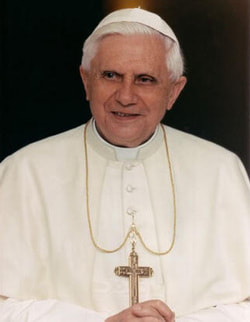
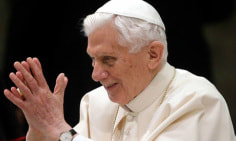
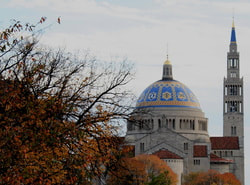
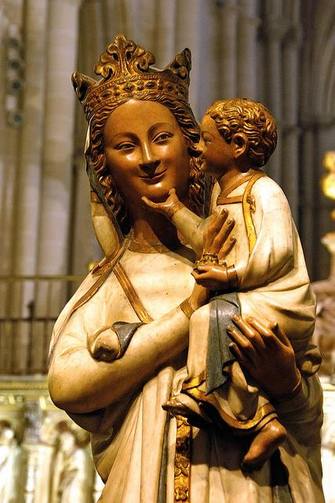
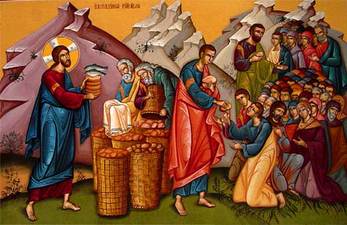
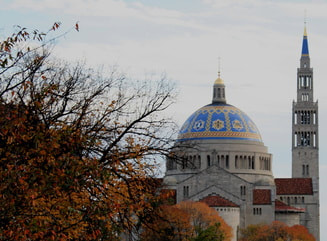
 RSS Feed
RSS Feed